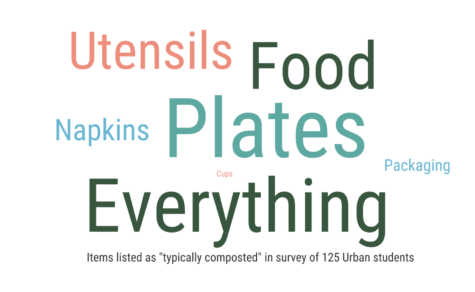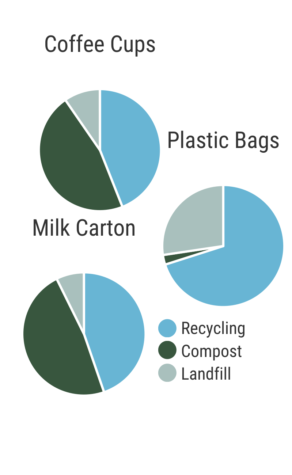San Francisco and The Urban School strive to meet Zero Waste goal by 2020
In August, 2017, the San Francisco Department of Environment and Recology announced that items once considered waste, including plastic bags and plastic wrap, can now be recycled. The Department of Environment called these changes “the most significant changes to the city’s recycling program since it was launched in 2000” in their subsequent press release.
The other items that are now recyclable include ice cream cartons, coffee cups, and milk cartons. However, all of these items must be emptied before being recycled.
San Francisco’s efforts to increase participation in compost and recycling are to fulfill San Francisco’s Zero Waste goal by the year 2020.
In 2009, the San Francisco Board of Supervisors passed the San Francisco Mandatory Recycling and Composting Ordinance which requires all San Francisco residents to separate their compost, recycling, and landfill and dispose of each separately.
According to the San Francisco Environment website, San Francisco diverts 80 percent of its discards from the landfill (1,593,830 tons diverted in 2010), higher than “any major city in North America.”
In a survey conducted by The Urban Legend on October 26th, 2017, only 25.5 percent of the 125 volunteering Urban School students and faculty said that they recycled plastic bags, indicating that many are unaware of the updated regulations.
Even within school walls, items are not always disposed of properly. The Urban School has dozens of tricenters, units containing a trash bin, recycling bin, and compost bin around the school, which dramatically reduces the amount of landfill the Urban School produces. Even in most classrooms, there are recycling bins in addition to trash bins. However, these tricenters are not always used to their full potential. Only 36.8 percent of the surveyed volunteers said that they were always sure about which bin to dispose of their items in.
This became apparent during a waste audit conducted by The Urban School leadership organization Green Team during the 2016-17 school year. The waste audit determined how well the tricenters around campus were being used based on weight. According to data collected by Green Team, the waste audit revealed that 44.5 percent of items in the collected landfill from Urban School tricenters should have gone in compost and 19 percent should have been in recycling. In terms of recycling, 60 percent should have been in the compost, and 2 percent should have been in the trash. This means that the majority of items in both landfill and recycling should have been composted.
Unbeknownst to many Urban School students, all of the packaging from the Urban School food provider service, Flik Independent School Dining, is compostable (except for chip packets). Only 30% of students surveyed indicated that they were aware that Flik items that could be composted.
Taghi Amundson (‘18), a member of Green Team, said “Flik packaging looks like trash, in terms of conventional packaging, but because of the materials they use, they can be composted.”
Green Team is making efforts to improve the way students use the tricenters at school: Amundson said, “signs are gonna be put up above the cans, so you have some help in making your decision… and we’re gonna try and give more presentations to incoming freshmen to have them be ready from the start.”

Items listed as “typically composted”
in survey of 125 Urban students. By Kian Nassre, Editor in Chief of Visuals.
How respondents in a survey of 125 Urban students said they disposed of certain items. The correct answer for all three is recycling. Infographic by Kian Nassre, Editor in Chief, Visuals.


